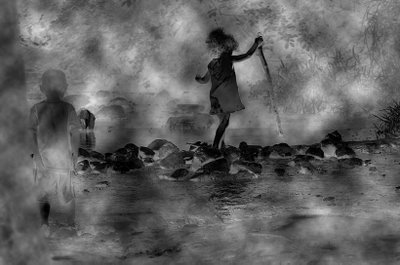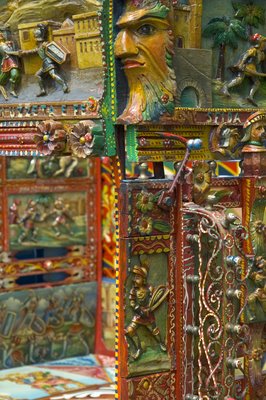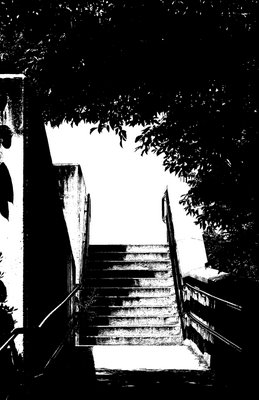
Theology. The study of God. Or, to borrow a weasel phrase, the study of God-related program activities. As in, "They were unable to unearth evidence of God, but they found a hell of a lot of Church."
She was in one of her famous metaphysical snits again, this one precipitated by listening to some lectures on Christian theology. The lecturer, a witty Anglican with a major British accent, was discussing "Church" and the doctrinal underpinnings of faith. There could be, he said, no Christianity without Church. He "had little time for," he proclaimed, people who continued to attend Church after relinquishing all the doctrinal requirements of their faith. They were exploiting, he intoned, the community. The generous community, he added. They were manifesting an "infantile refusal" to let go of the final vestige of their rejected and despised faith. Like those apostate scoundrels from the Sea of Faith.
She squirmed. Her cheeks reddened as if the speaker's eyes were fixed upon her from somewhere deep within her car's CD player. She'd come across the "Sea of Faith," and had appreciated its deconstructive, linguistic approach to religion. She, herself, had approached the Church's generous table with the mind and heart of a reader of poetry, not the Faith of a Believer. She wasn't interested in accepting Jesus Christ As Her Personal Saviour. She, in fact, had no idea what that meant. She was attepting to explore whether there was within Christianity a vocabulary, a set of metaphors, adequate to the task of containing and expressing the mystery of the ground of being and the wonder and anguish of being here at all. She did like the metaphor of the Body of Christ, although she felt that limiting it to the Church and its members was a mistake: how could a metaphor purporting to address encompassing ontologies -- God drawing up everything into Christ, the speaker had said -- be limited to such earthly institutions as churches and those who pledge their troth thereunto ?

What about, for example, her old, sick cat ? Or strip-mined landscapes and oil-covered seagulls ? Or collaterally damaged babies in the Middle East ? But if everything were included in the body of Christ, if everything were, through Christ, to be granted automatic participation in God, then where would that leave Christians and all their Christ-related-program activities: sacraments, liturgy, scripture, prayer, faith and works, coffee hours and bake sales ? If everyone, including the unbaptised -- atheists, Buddhist, Muslims, pagans, Hindus -- were part of the Body Of Christ, wouldn't that obviate the need for Church ? It was all too complicated. She was tempted to reduce it all to membership in an elite club, with rules, initiation rites, pledges, dues, and, above all, exclusivity.
And up to now she'd assumed the pastor would at least tolerate a quiet guest in the back pew. But now she knew better. The pastor had her number, and it was 666. He could smell an exploitative apostate a mile off. The stench of unbelief was oozing from her pores like sulfur. She could no longer bank on that thing that happened so long ago, her baptism, as a ticket in the door, and then a meal ticket. Not that she would ever gatecrash a Catholic table. She was always one to play by the rules: she was Protestant, divorced, a real scandal, and she knew she wasn't welcome. But she'd assumed those other tables, those more open ones, were sincere in their welcome. Maybe she'd been hasty in her assumption. They didn't want the likes of her among the likes of them. She was, in a word, unclean. Indelibly so. She imagined her prayer, answered.
Create in me a clean heart, O Lord.
In you ? You're kidding, right ? (Cue cosmic laughter.)

So why was she still gazing with longing at the empty brightness at the top of the Stairs ?
And what did the Byzantine contraption known as Christian doctrine have to do with it ?
No comments:
Post a Comment